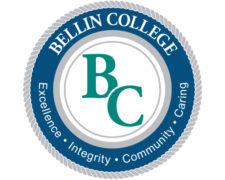Title IX
Bellin College is committed to maintaining a living, working, and educational environment free from sexual harassment, sexual violence, and sexual discrimination. It is the policy of Bellin College to comply with Title IX. Title IX of the Education Amendments of 1972 is a federal civil rights law that prohibits discrimination on the basis of sex in federally funded educational programs and activities. Title IX prohibits sex discrimination in all College programs and activities including, but not limited to recruiting, admissions, financial aid, academic programs, student services, counseling, discipline, roster assignment, grading, and employment.
It is the policy of Bellin College to be non-discriminatory because of race, color, creed, national and ethnic origin, religion, age, gender, gender identity, sexual orientation, marital status, or disability in the admission of students, in student programs, and in the employment of College faculty and staff.
Bellin College Title IX Statement and Complaint Form
Bellin College Title IX Policy and Procedure
Bellin College Discrimination and Harassment Policy and Complaint Form
Bellin College Student Grievance Policy and Forms
Addressing Sexual Harassment and Sexual Violence
- What is Title IX?
- Sexual Harassment & Sexual Violence
- Consent
- Awareness & Prevention
- Reporting
- Contacts
- How to respond
- Additional resources
PURPOSE:
What is Title IX?
Title IX of the Education Amendments of 1972 Implementing Regulations at: 20 U.S.C. & 1681 & 34 C.F. R. Part 106, is a Federal civil rights law that prohibits discrimination on the basis of sex in educational programs and activities. Sex discrimination encompasses all forms of sexual violence and sexual harassment by employees, students, or third parties against students, employees, or third parties.
Sexual Discrimination, Sexual Harassment & Sexual Violence
Sexual Discrimination: Sex discrimination involves treating someone (a student or employee) unfavorably because of that person’s sex. Discrimination against an individual because of gender identity, including transgender status, or because of sexual orientation is discrimination.
Sexual Harassment: Misconduct on the basis of sex that satisfies one or more of the following conditions: Unwelcome conduct that a reasonable person would determine to be so severe, pervasive and objectively offensive that it effectively denies a person equal access to the school’s education program or activity; sexual assault, as defined in the Clery Act, or dating violence, domestic violence or stalking as defined in the Violence Against Women Act (VAWA); a school employee conditioning education benefits on participation in unwelcome sexual conduct (i.e., quid pro quo). Only one of the three conditions listed must be met for the conduct to be considered sexual harassment.
Sexual Violence: The United States Department of Education’s Office of Civil Rights 2014, defines sexual violence as “physical sexual acts perpetrated against a person’s will or where a person is incapable of giving consent. An individual’s inability to consent to sexual activity may arise from use of drugs or alcohol or individual conditions including intellectual or other disability”. Sexual violence includes rape, sexual assault, sexual battery, sexual abuse, and sexual coercion. Sexual violence can be carried out by school employees, other students,
or third parties.
For example…
- Sexual violence or intimate partner violence
- Attempting to coerce an unwilling person into a sexual relationship
- Engaging in sexual interactions without freely given consent
- Conditioning a benefit on submitting to sexual advances
- Gender-based stalking or bullying
- Repeatedly subjecting a person to egregious, unwanted sexual attention
- Touching of a sexual nature
- Sexually suggestive phone calls, texts, email, or social media posts; gestures, jokes, or innuendos; derogatory, degrading, or sexist remarks about a person’s body, clothing, or sexual activities
- Displaying or distributing sexually explicit drawings, pictures, or written materials
- Reprisal for a refusal to comply with any of the above statements
Consent
Sexual activity requires consent, which is defined as positive, unambiguous, and voluntary agreement to engage in specific sexual activity throughout a sexual encounter. Consent as defined by Wisconsin state law:
“Words or overt actions by a person who is competent to give informed consent indicating a freely given agreement to have sexual intercourse or sexual contact.” Minors, persons suffering from mental illness or defect, and sleeping or unconscious persons are presumed unable to give consent. Failure to resist does not indicate consent. -WI Statute Section 940.225 (4).
Awareness & Prevention
Awareness and preventive measures are key elements in reducing the risk of assault, but no one can predict or control another person’s behavior. Most assaults are committed by people the victim knows. If you are a victim of sexual assault, seek support and help immediately.
The use of alcohol or drugs can interfere with your ability to assess situations and to communicate effectively. Do not accept drinks from people you do not know well or leave your beverage unattended. Tell a friend if you suspect you have been drugged unknowingly.
Trust your instincts about possible danger and take appropriate actions to protect yourself. Look out for others, as well as yourself. Use the “buddy system.” Get involved if you believe a friend is at risk. Do not be afraid to intervene if you see that a friend is in trouble or being pressured in any way.
Procedure
Reporting
Don’t be afraid to report.
Sometimes people are afraid to report sexual violence or harassment because drugs or alcohol are involved. The College’s highest priority is the safety of everyone on campus. Any other rule violations will be handled separately from the sexual harassment or violence complaint. The use of alcohol or drugs never makes the person who was victimized at fault for sexual violence.
We do not tolerate retaliation.
The College prohibits any form of retaliation against a complainant. Any allegations of retaliation will result in an immediate investigation and appropriate action consistent with the College’s due process procedures.
Take action and don’t ignore it.
Pay attention to cues, comments, instincts, and experiences. Address unwanted contact immediately.
Say no.
Tell the person that the conduct is unwanted. Tell them to stop.
Tell someone.
If you are a student, tell a faculty member, campus security, a staff member, or anyone that can help. If you are an employee, tell your supervisor, an administrator, a staff or faculty member.
We take every complaint seriously
Bellin College takes any complaint about sexual violence or sexual harassment very seriously. The College follows the guidelines published by the U.S. Department of Education and Office of Civil Rights. Each complaint is immediately assessed to determine imminent danger and duty to warn others. A preliminary investigation is performed. Once an outcome has been determined based on the preponderance of evidence, the complainant and respondent are informed and appropriate actions are taken based on that outcome.
Contacts
Confidentiality & Reporting
Who to tell
In order to make informed choices when consulting college resources, people that have been victimized need to be aware of confidentiality and mandatory reporting laws.
Some resources may maintain your complete confidentiality, offering you options and advice without obligation to tell anyone, unless you want them to.
Other resources are expressly there for you to report crimes and policy violations, and they are obligated to take action when you report your victimization.
If you are unsure of someone’s duties and their ability to maintain your privacy, be sure to ask before talking to them.
Confidential help
For complete confidential assistance, contact MaKayla Schroeder or Bridgett Lowery. Privacy laws prohibit these individuals from disclosing your conversation without permission.
Reporting
You may also make a formal or informal complaint directly to the Title IX Coordinator. They will initiate an immediate investigation of the complaint.
Resources available Monday through Friday
8:00 a.m. – 4:30 p.m.
 Sarah Woolsey Sarah WoolseyDeputy Title IX Coordinator (920) 712-6550 sarah.woolsey@bellincollege.edu |
 Lawrence Potter Lawrence PotterDeputy Title IX Coordinator (920) 433-6672 lawrence.potter@bellincollege.edu |
 Benny Rieth Benny RiethTitle IX Coordinator Office Phone: (920) 433-6656 Cell Phone: (920) 639-3609 benjamin.rieth@bellincollege.edu |
 Chad Dall Chad DallTitle IX Official with Authority (920) 433-6691 chad.dall@bellincollege.edu |
 MaKayla Schroeder MaKayla SchroederConfidential Help Title IX Advocate (920) 433-6663 makayla.schroeder@bellincollege.edu |
 Bridgett Lowery Bridgett LoweryConfidential Help Title IX Advocate (920) 433-6662 bridgett.lowery@bellincollege.edu |
How to respond to sexual violence
Medical Care
As soon as possible, the victim should get medical care. The victim will benefit from being examined for physical injury or infection, and possible pregnancy. In order to preserve physical evidence of assault, do not bathe, shower, douche or change clothes before the exam. It is best to report the incident within 120 hours (5 days).
Report the Incident
Several avenues are available for reporting a sexual assault or rape; criminal prosecution, civil prosecution, prosecution through the student, non-academic disciplinary procedures, or making a confidential/anonymous report.
Filing a confidential report does not obligate the victim to press charges. No action will be taken without your consent. The only exception required by law is the reporting of sexual assaults to individuals less than 18 years of age.
Additional Resources
Additional resources available 24/7
UWill – Student Mental Health & Wellness
Please go to your canvas page and click on help and resources or email campuslife@bellincollege.edu for UWill access.
Sexual Assault Center – (920) 436-8899
Golden House – (920) 432-4244
Crisis Center – (920) 436-8888
SANE, Sexual Assault Nurse Examiner, St. Vincent Hospital – (920) 433-8384


